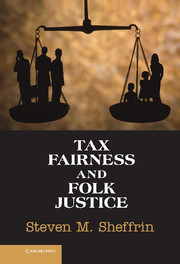Book contents
- Frontmatter
- Dedication
- Contents
- Preface
- Glossary of Terms in Psychology, Philosophy, and Economics
- 1 Approaching Tax Fairness
- 2 The Foundations of Folk Justice
- 3 Fairness and the Property Tax
- 4 Should We Redistribute Income through Taxation?
- 5 Why Do People Pay Taxes?
- 6 Desert, Equity Theory, and Taxation
- 7 Concluding Perspectives
- Bibliography
- Index
3 - Fairness and the Property Tax
Published online by Cambridge University Press: 05 July 2013
- Frontmatter
- Dedication
- Contents
- Preface
- Glossary of Terms in Psychology, Philosophy, and Economics
- 1 Approaching Tax Fairness
- 2 The Foundations of Folk Justice
- 3 Fairness and the Property Tax
- 4 Should We Redistribute Income through Taxation?
- 5 Why Do People Pay Taxes?
- 6 Desert, Equity Theory, and Taxation
- 7 Concluding Perspectives
- Bibliography
- Index
Summary
In this chapter we confront the paradox of the property tax. It earns high marks from economists both as a relatively efficient and equitable tax. Economists also value the property tax because it allows for a relatively efficient decentralization of decisions about the scope and provision of public services, which aligns desired levels of spending with an actual expressed willingness to pay for the services through taxation. Overall, it fares very well on expert grounds.
Yet, the public clearly dislikes the property tax even relative to other taxes. As we briefly highlighted in Chapter 1, surveys consistently show low public regard for the property tax. Recall two facts. First, the Tax Foundation’s 2006 Annual Survey of U.S. Attitudes on Tax and Wealth found that 39 percent of respondents characterized the property tax as “the worst tax – that is, least fair” of state and local taxes, compared to 20 percent for state income taxes, 18 percent for sales taxation, and 7 percent for the state corporate income tax. Second, taxpayers have taken political steps to curb the property tax, with only 5 of the 48 states of the continental United States not having any limits. Both through their responses to surveys and their actions, the public has signaled that the property tax is one of the least favorite taxes in the United States. Its only rival is gasoline tax, but only at times of high gasoline prices.
- Type
- Chapter
- Information
- Tax Fairness and Folk Justice , pp. 69 - 117Publisher: Cambridge University PressPrint publication year: 2013



